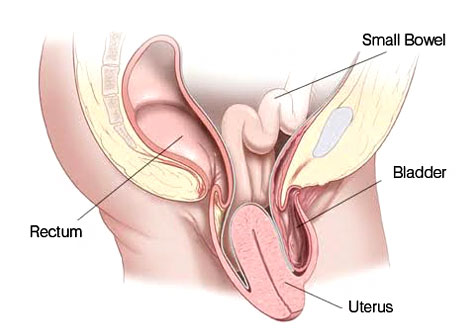
Occurs when pelvic floor muscles and ligaments stretch and weaken and do not provide enough support for the uterus. As a result, the uterus slips down into or protrudes out of the vagina.
Uterine prolapse can occur in women of any age. But most commonly affects postmenopausal women with vaginal delivery in the past especially if forceps or vacuum has been used.
Mild uterine prolapse usually doesn't require treatment, but if it causes discomfort or disrupts your normal life, you might benefit from treatment.
Symptoms
Mild uterine prolapse generally doesn't cause signs or symptoms. Signs and symptoms of moderate to severe uterine prolapse include:
- Sensation of heaviness or pulling in your pelvis
- Tissue protruding from your vagina
- Urinary problems, such as urine retention
- Incomplete emptying of bowel
- Sexual concerns, such as a sensation of looseness in the tone of your vaginal tissue
- Intermittent spotting or post coital bleed.
Often, symptoms are less bothersome in the morning and worsen as the day goes on.
When to see a doctor
See your doctor to discuss your options if signs and symptoms of uterine prolapse become bothersome and disrupt your normal activities.
Causes
- Pregnancy
- Difficult labour and delivery or trauma during childbirth
- Delivery of a large baby
- Being overweight or obese
- Lower estrogen level after menopause
- Chronic constipation or straining with bowel movements
- Chronic cough or bronchitis
- Family history of weakness in connective tissue
Complications
Uterine prolapse is often associated with prolapse of other pelvic organs. You might experience:
- Anterior prolapse (cystocele)- Anterior prolapse is also called prolapsed bladder.
- Posterior vaginal prolapse (rectocele)- You might have difficulty having bowel movements
Severe uterine prolapse can displace part of the vaginal lining, causing it to protrude outside the body. Vaginal tissue that rubs against clothing can lead to vaginal sores (ulcers.) Rarely, the sores can become infected.
Prevention
To reduce your risk of uterine prolapse, try to:
- Perform Kegel exercises regularly- These exercises can strengthen your pelvic floor muscles — especially important after you have a baby.
- Treat and prevent constipation. Drink plenty of fluids and eat high-fiber foods, such as fruits, vegetables, beans and whole-grain cereals.
- Control coughing. Get treatment for a chronic cough or bronchitis, and don't smoke.
- Avoid weight gain. Talk with your doctor to determine your ideal weight and get advice on weight-loss strategies, if you need them.
